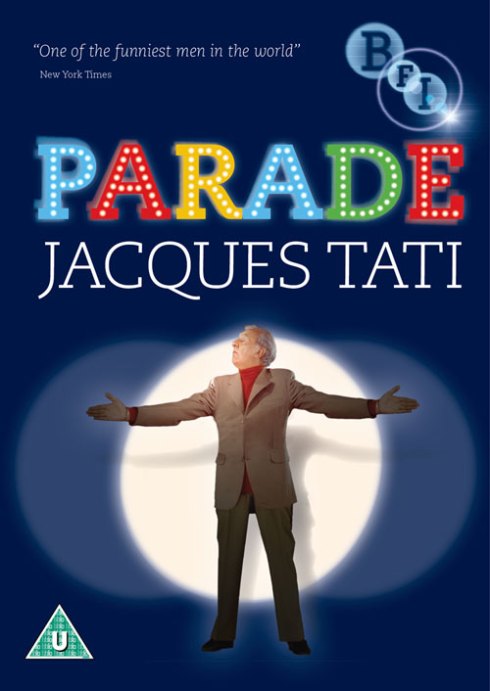
Jacques Tati's Parade (1972) available on BFI DVD, 22 June 2009
Rarely seen, this is a welcome release of master French comic Jacques Tati’s final film as both director and performer. Made for television, Parade is a live compendium of circus, music hall and magic acts hosted by Tati himself. With opening scenes of audience members taking their seats, the film appears at its outset to be a recording of a 1970s Tati-on-tour live show, a final attempt to sell tickets as a comic giant’s career wanes. But although we may witness a mid-show interval and genuine audience reactions, it becomes apparent that the film is a playful and imaginative take on the experience of seeing a show. Sketches play out in the corridors, in the theatre bar and indeed after the show has ended.
In a similar vein to Charlie Chaplin’s Limelight, in which he revisits his music hall past, Parade is a return to Tati’s own music hall experiences during the 1930s. Tati’s key performances during the film revolve around the miming acts that gave him early success. He is transformed into a goalie, a boxer and a tennis player, and even at one point becoming an English policeman. While at first these may appear as comic ideas too antiquated to still remain humorous, Tati infuses them with an accuracy that is indeed very funny – in particular watch for his recreation of a tennis match in slow motion.
The film is filled with surrealistic touches, with cardboard cut-outs planted amongst the audience and a set that is constantly being painted even as the show is playing out. During the interval the bartender bursts open a soft drink only to find his own head springing a leak. With the audience playing a key role in the film’s focus, the space between audience and performers become blurred, especially when members of the audience cross onto the stage and participate in the action. One enthusiastic bald spectator finds himself compelled to jump into the ring and ride a wild pony, while a conspicuously bored blonde boy wanders in and out of the action. As these participations occur, the character of the audience shifts from innocence to complicity, yet throughout the film the audience’s reactions are so convincingly spontaneous that they are clearly fulfilling their role as genuine spectators by having a good time.
Other acts performed by the troupe include juggling, acrobatics, sword swallowing, singing and clowning. Even when performed to the 1970s audience, these acts appear as though from another time, each one evoking a lost circus and music hall tradition. As such Parade acts as a kind of final record of long-forgotten acts and entertainments. Traditions such as mimesis, which Tati himself excelled in, have long since been ridiculed as the cliché of outdated entertainment but what Parade does is show us how it is meant to be done. This results in unexpected reactions; a miming showjumper forces us to imagine a galloping horse, only for that very animal to then stride into the ring for real and put flesh to our fantasies.
Parade is the latest in a range of Jacques Tati films that the British Film Institute have strived to make available on DVD, and they have done so in this case with a pristine transfer. The film was originally produced on a combination of video, 16mm and 35mm, and has undergone a digital restoration which has resulted in Parade looking and sounding as good as it possibly can on DVD.
Special features
• Previously unseen interview with Jacques Tati, filmed in London in 1977 (19 mins)
• Illustrated booklet with essays by Philip Kemp and Jonathan Rosenbaum; director biography and credits
Available At
Amazon.co.uk
BFI Filmstore
Release date: 22 June 2009
RRP: £19.99 / cat. no. BFIVD808 / cert U
France / 1974 / colour / French language with English subtitles / 84 mins /
Ratio 1.33:1




1 comment
Comments feed for this article
July 11, 2009 at 12:05 pm
Beth
Hiya there! This is also a very interesting blog. I just rewatched Monsier Hulot’s holiday, which reminded me just how wonderful Tati was!
Feel free to link to my blog, it’s very kind of you to even look it up, I always assumed that its subject matter was too specialist to attract much interest, so I’m always pleasantly suprised how many people seem to share my interest! I havent yet seen all Gingers films, I’ve seen about 60 of the 73, and have located (in various forms – though ultimately I’d like to have them all on dvd!) all but 14 (including 3 short films). I’m in the process of posting on these elusive few, in the hope that someone, somewhere has a grandma with an ancient vhs or something!!
All the best
Beth xx